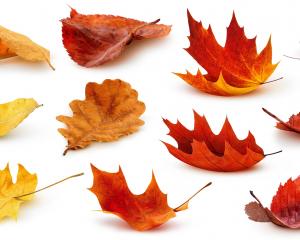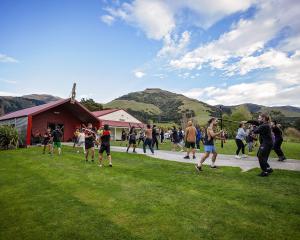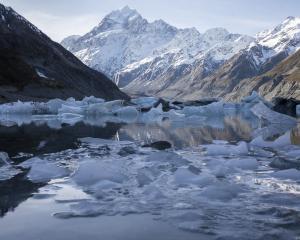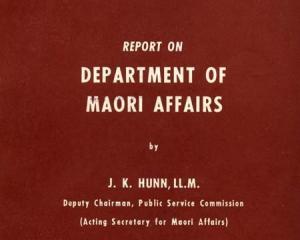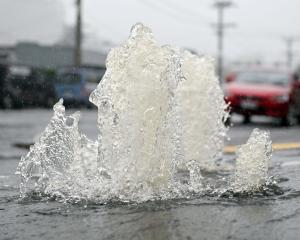
Ko wai tōna ingoa? What is their name? Those four words are so powerful. Ko Raapana Waata ia. She or he is Raapana Waata. In te reo Māori, that short sentence is beautiful. It is genderless. No misogynistic statements can be made about my friend’s name as tōna is her/his or singular their, and ia is her/him or singular them.
Using tōna instead of tāna or tana also indicates the treasure and importance of their name; that it isn’t neutral. That sentence also says where my friend is from, as with the diaeresis of Waikato, aa is used instead of ā. There is a lot in a name, whether it is a person or a fight.
Raapana and I decided to explore the context of a story we were close to: Ka Whawhai Tonu — Struggle Without End, a full-length feature movie telling a major story set at Ō-Rakau, near Kihikihi (this was before my friend Anaru Eketone wrote his opinion piece for the Otago Daily Times a couple of weeks ago). Ka Whawhai Tonu alluded to previous "skirmishes", such as Rangiaowhia, but we will repeat the words of one of our aunties: "At least what occurred at Ō-Rakau was some sort of battle, but what happened before, at Rangiaowhia, was just a slaughter".
Naming what happened at Ō-Rakau as a battle gave the colonialists legitimacy to have that fight. Just 24 years earlier, the British representative had signed the Treaty. The English version of article two included this text, that the chiefs and tribes had "full exclusive and undisturbed possession of their Lands and Estates, Forests, Fisheries and other properties which they may collectively or individually possess so long as it is their wish and desire to retain the same in their possession".
Our tūpuna were defending their pā at Ō-Rakau, their land. It was their mokopuna, iterations of grandchildren at Ōtorohanga College, who petitioned the government in 2014 that more needed to be done to commemorate the New Zealand Land Wars. They successfully argued that "such a pivotal time in our history would be unwise to forget" and "we owed it to our ancestors, to ourselves, and to our future generations to understand why roads traverse sacred sites that have become national secrets, why there is a fight to retain our native language, why we need a Treaty settlement process, and why we must refute it when it is said that our nation was settled peacefully". The young people of today want the history taught in their classrooms to reflect the history that is relevant for them and where they live.
Further discussion about this history is even more important, perhaps, given persistent attempts to dismiss the events at Ō-Rakau, as evidenced by the response to Anaru’s opinion piece. One correspondent suggested we get over it, arguing that Māori were colonisers of each other. Thankfully, letters to the editor must be short, so we were saved from a diatribe, but the letter usefully illustrated how important it is to question people’s sources, and who they are in repeating their version. The attempt to legitimise colonisation and justify war with a "what about" argument just seems lame.
We have no authority or legitimacy to comment on what the correspondent said about what was happening in the South Island in 1700s, so we will take our own advice and say no more about that part of their letter.
We are also of the opinion that the writer missed the point of the name of the film in English — "Struggle Without End". The second part of their letter bemoans "brooding about the past" and contends that Māori must accept the reality that they have equal rights regardless of historical wrongs. Thankfully, for the Ō-Rakau site, it has been acknowledged by the government that there were significant wrong-doings and that its ownership must change.
Raapana and I also write this on the day that the Abuse in Care Royal Commission of Inquiry report is released. The advice of the letter writer to "get over it", and their bristling that our stories of the past have some opportunities to be shared, to be talked about, only indicates that they could, should, but really must start reading, watching and listening to something different to realise that these aren’t one-off narratives, they are part of the complex interwoven stories, giving context to the wealth, rights, behaviour and opportunities of us all today. We don’t start this journey at the same place.
To help people figure out where their opportunities diverted from those of others’ ancestors, a search for the NZ Wars videos, elegantly hosted by Mihingarangi Forbes, may give some context for some places. Also in these areas, Vincent O’Malley has a series of amazing tomes about the land wars. If listening is your jam, there is the Aotearoa History Show, which covers a variety of locations throughout the country. For those here in this rohe/area, there are resources by those from Kai Tahu, including Tā Tipene O’Regan, Athol Anderson, Angela Wanhalla, Te Maire Tau, Michael Stevens and Megan Potiki to name a few key people.
The ODT Toitū te whenua - Māori Place Names Series is such a rich resource.
Finally, we return to the kaupapa of this piece, "ō tātou ingoa", our names. We expect adding a Māori name to this piece will trigger some, so while we were able to state that "ko Raapana Waata ahau" was genderless and locational, it also opens the writers to the racist opinions that don’t seem to be triggered by a non-Māori name. That also seems lame, but heoi anō, ka whawhai tonu mātou (we will continue to fight), ake, ake, ake (as long as it takes).
* Ko wai tōu ingoa? translates as "What is your name".


